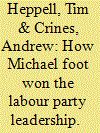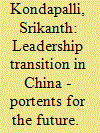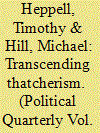| Srl | Item |
| 1 |
ID:
103545


|
|
|
|
|
| Publication |
2011.
|
| Summary/Abstract |
This paper examines the voting motivations of Labour parliamentarians in the final parliamentary ballot of the Labour party leadership election of 1980. By constructing a data set of the voting behaviour of Labour parliamentarians and by determining the ideological disposition of the 1980 parliamentary Labour party (PLP) this paper examines the ideological disposition of the candidates' vis-à-vis their electorate, and offers a challenge to traditional interpretations of how and why Foot was elected. The traditional interpretation has sought for explanations as to how a right-wing dominated PLP elected a left-wing candidate. Whilst citing the traditional interpretations of the impact of the impending Electoral College, mandatory reselection and the assumed weaknesses of the Healey campaign, this paper argues that there was considerably more left-wing sentiment within the 1980 PLP in terms of economic management, defence and the Common Market, than previously considered. As such this paper suggests that, taken with the impact of the other factors, the victory of Foot should not be seen as that surprising.
|
|
|
|
|
|
|
|
|
|
|
|
|
|
|
|
| 2 |
ID:
117812


|
|
|
| 3 |
ID:
092409


|
|
|
|
|
| Publication |
2009.
|
| Summary/Abstract |
This paper examines the voting motivations of Conservative parliamentarians in the final parliamentary ballot of the Conservative Party leadership election of 2005. By constructing a data set of the voting behaviour of Conservative parliamentarians in the final parliamentary party ballot, and by determining the ideological disposition of the 2005 PCP this paper examines the ideological disposition of the candidates' vis-à-vis their electorate. The paper identifies the increasing Thatcherite nature of the PCP across three dominant ideological divides of contemporary British Conservatism-economic, European, and social, sexual and moral policy. Through such an analysis the paper demonstrates how the modernising David Cameron, who came first in the final parliamentary ballot and then won the membership ballot, transcended the traditional ideological voting motivations of candidates' vis-à-vis their electorate. Most significantly, the paper demonstrates that the European ideological policy divide was not a factor in the succession contest, unlike the succession contests of 1990, 1997 and 2001.
|
|
|
|
|
|
|
|
|
|
|
|
|
|
|
|